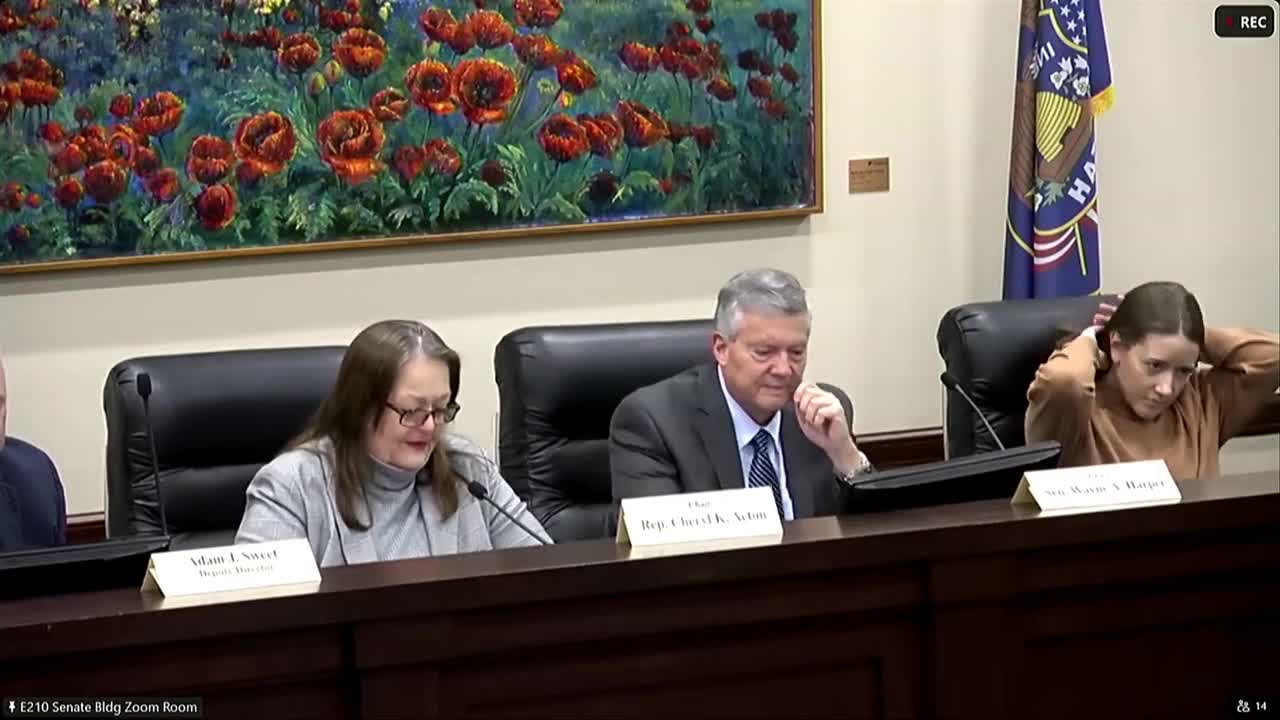Committee favors retirement modifications bill; clarifies 'bona fide' termination and adds council members
Get AI-powered insights, summaries, and transcripts
Subscribe
Summary
The Retirement and Independent Entities Committee on Oct. 25 favorably recommended a committee bill that would standardize a "bona fide termination" definition across Title 49, add three members to the Utah Retirement Systems membership council, and make several administrative clarifications to retirement law.
The Retirement and Independent Entities Committee on Oct. 25 voted to favorably recommend a committee bill titled "Retirement Modifications," a package of primarily technical and administrative changes to Utah retirement law.
The bill would: create a uniform definition of "bona fide termination of employment" across Title 49; add three seats to the Utah Retirement Systems (URS) membership council (the director of the Department of Human Resource Management, a local school board member and a district superintendent); clarify that judges' tier 1 retirement is not transferable to tier 2; allow the attorney general and certain senior attorney general staff an exemption from URS if they opt in; authorize the URS executive director to delegate appeal rulings to a senior management member; and explicitly prohibit a member or participant from permanently relinquishing a defined benefit or defined contribution account.
The measure was introduced to the committee by committee members and then described in detail by committee counsel and URS staff. Attorney Christine Gilbert summarized the draft, saying it "provides a uniform definition of bona fide termination of employment for all of title 49." D. Larson, general counsel for Utah Retirement Systems, explained the policy background, citing federal guidance and the need to prevent pretextual retirements that effectively allow a person to collect a pension while continuing to perform paid work (the colloquial term he used was "double dip"). Larson said the change is intended to make statutory language consistent and transparent across retirement chapters.
Representative Thurston pressed URS staff for examples of conduct the language is meant to capture. He asked whether shifting from employment to a contractor or fee-for-service relationship to circumvent retirement rules would be subject to scrutiny. Larson replied that the proposal would capture fee-for-service arrangements: "That's 1 of the areas that gets caught in that... people sometimes don't think about that. They think about employment and they can try and put all kinds of labels on things." He noted exceptions already in post-retirement reemployment rules (for example, limited earnings exceptions and a 60-day sit-out provision tied to certain earnings limits).
Committee members also discussed the membership-council expansion. URS staff said the change affects the advisory membership council (not the seven-member fiduciary retirement board) and was requested by stakeholders including superintendents and school boards seeking stronger employer-side representation.
There was no public comment on the bill during the committee meeting. Senator Harper moved that the committee "favorably recommend retirement modifications as an interim committee bill." The chair called for a voice vote; multiple members verbally recorded "aye," and the motion carried without recorded opposition.
The committee also approved minutes from its Sept. 9 meeting before taking up the bill.
The draft bill as discussed is mostly technical and, according to URS staff, reflects changes requested by URS or intended to make existing practices explicit in statute. Committee members asked for clarity on specific exceptions and the scope of the bona fide-termination standard; URS staff referenced existing board resolutions and federal guidance that inform implementation.
Looking ahead, the committee bill will proceed as the committee's interim bill recommendation. URS staff told the committee they will continue to engage stakeholders and provide technical clarifications as the bill moves through interim review.
